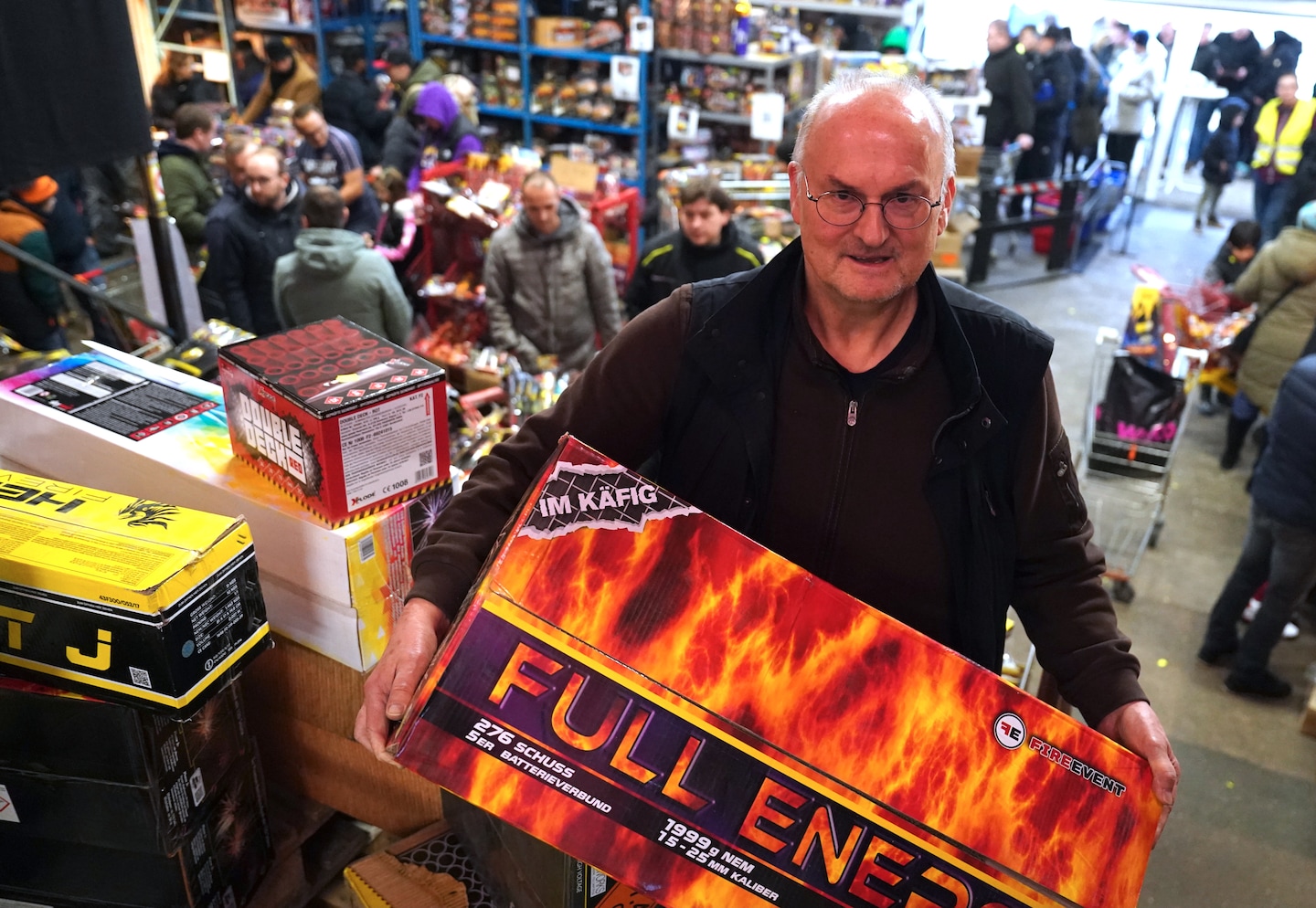“Five hundred eighty shots!” his wife, Manuela, responded. They both smiled.
Until just hours earlier, everything about this sale would have been illegal. Most private firework purchases are banned in Germany, except for the days leading up to New Year’s, and they were completely prohibited over the past two years because of concerns that injuries could push pandemic-strained hospitals to the brink of collapse. But as covid-19 fears have faded, the tradition of whistling rockets, sparkling pyramids and bursting firecrackers is experiencing a controversial resurgence this year.
For the millions of fireworks enthusiasts in rules-obsessed Germany, the minutes around New Year’s Eve are a rare opportunity to break out of daily routines and light the skies above their homes.
“It’s all about having fun,” said Schreiber, who paid $532 for the box of rockets that will captivate the attention of his neighborhood for five to six minutes.
A different customer, Valentin Lübbert, 45, compared Germany’s annual firework mayhem to a national experience of “catharsis and self-cleansing.”
“In the past, when things got especially out of control” on New Year’s Eve night, he said, it was particularly calm afterward. “People let off a lot of steam.”
But many regret that the pandemic ban on private firework sales has been lifted. Surveys suggest that criticism of the tradition is growing, and more than half of all Germans favor at least a limited ban on private firework displays. Many would prefer displays organized by city authorities, like the annual fireworks around the Brandenburg Gate in Berlin, over having their neighbors experiment with supermarket-purchased rockets on the front lawn.
Jochen Kopelke, the head of the German police union, said he fears a particularly bad situation this New Year’s Eve — including firework rocket attacks on officers. He supports a permanent ban, saying that over the past two years, “the positive effects were too substantial, too clear and too noticeable” to argue the opposite.
In New Year’s Eve celebrations before the pandemic, thousands of Germans were injured by rogue fireworks in the span of just a few hours. Masuod Yousefzada, a doctor practicing near Berlin, said the sudden influx of patients in emergency rooms has reminded him of war casualties in places such as Afghanistan, where he grew up.
“Hand burns, face burns,” he said, adding that the stream of victims usually starts around 20 minutes after midnight. “Why are people okay with this happening?” he wonders.
Germany is one of the few big nations in Europe that allow private fireworks on this scale. Critics say that besides leaving people seriously injured, the displays pollute the air with particulates, kill birds and risks re-traumatizing refugees from war zones including Ukraine.
Researchers say the debate reflects broader trends in Germany. “New Year’s Eve is a culmination point for the tensions and all the divides in our society,” said Manuel Trummer, a comparative European ethnologist at the University of Regensburg. He suggested that support for firework displays is akin to the dynamics that drove anti-mask protests during the pandemic, or that are behind the resistance to climate action. “Sacrifice is politically very difficult to convey,” he said.
Jürgen Resch, the head of Environmental Action Germany, said his nonprofit organization’s campaigns against New Year’s fireworks often prompt the most serious safety threats it faces. At one point, the NGO was placed under police protection, he said.
“We don’t see this with other topics in that intensity,” he said. Perhaps as a result, German lawmakers have largely shied away from efforts to curb firework use, despite a number of past promises to do so, he said.
Historically, firework displays were a status symbol of European emperors competing for attention. Their lavish celebrations were the foundation of the organized displays that still regularly light up the Eiffel Tower in Paris, Tower Bridge in London and the Brandenburg Gate in Berlin.
But Germany’s more privatized approach may at least in part be rooted in the centuries-old New Year’s shooting tradition; in Bavaria and other regions, the new year was long greeted with gun salutes. After World War II, as Germany underwent rapid economic growth, the country’s pyrotechnics industry succeeded in making fireworks an essential part of New Year’s celebrations for many, partly “because they could build on existing customs that were not common in other countries,” Trummer said.
Although the widespread private use of fireworks goes back only around two generations, criticism of their use is much older. Some records show that as early as in the 16th century, churches were concerned about excessive spending on the displays.
Germany’s pyrotechnics industry — which has some of the biggest fireworks production sites in Europe and also is one of the world’s biggest exporters of the products — hopes it will sell at least as many fireworks this week as before the pandemic, when rockets and other items worth at least $128 million were purchased in Germany each year.
“That would be necessary for companies to at least somewhat compensate their losses of the past two years,” said Klaus Gotzen, the head of VPI, a pyrotechnics industry association in Germany. But increasingly, German companies are facing foreign competition — from legal fireworks produced in China and the United States and from illegal fireworks that do not meet German certification standards. Gotzen said the pandemic ban has amplified an illicit trade in fireworks from Eastern Europe.
German authorities warn that such fireworks — often imported from Poland or the Czech Republic — are more dangerous than the ones certified in Germany. Many would be categorized as explosives in Germany, meaning that their purchase and use could land buyers in prison.
“They’re louder and have a bigger explosive power. That seems to fascinate many people,” Gotzen said.
German companies want to be seen as the more responsible competition. At a pub turned store in the south of Berlin, some items sold this week included labels such as “reduced plastic,” “reduced noise” and “carbon neutral.”
But many customers still congregated around the more traditional rockets that were on sale. Christian Mann, one of the store executives, acknowledged that demand for the adapted fireworks has remained limited.
For many, he said, what makes the tradition so appealing is “reviving of old memories and old customs.”
Industry representatives say they walk a fine line trying to adapt without disgruntling their core customers, but some think a real solution would need to be more radical.
Environmental activist Resch cited recent experiments with laser shows or drone displays, accompanied by music, in some German towns. “Suddenly, many people — especially the elderly — came back out into the streets and said: ‘This is beautiful!’ For years, they had not dared to leave their homes” on New Year’s Eve, Resch said.
“What could be nicer than celebrating the new year with friends, neighbors or maybe strangers, by hugging each other — and not by having to worry about getting hurt,” he said.
Schreiber, the buyer of the Apocalypse-themed box of rockets, agreed.
“We managed to live without it for two years,” he said. “If they ban it, that would be fine. But given that it’s legal, one just does it.”
As he got into his car, another driver honked to alert him to a misdemeanor. The issue was not that he had purchased more than 580 shots of fireworks but that, to load his car, he had parked in the middle of the road.



